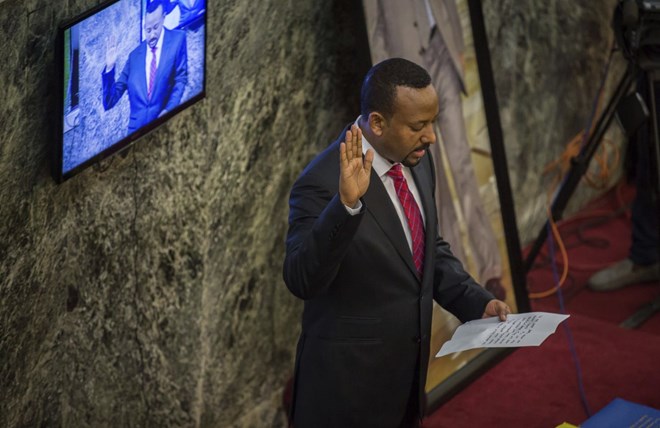
Monday April 2, 2018
By Elias Meseret

Abiy Ahmed, the newly elected chair of the Ethiopian Peoples’ Revolutionary Democratic Front (EPRDF) is sworn in as the country’s Prime Minister, Monday, April 2, 2018. Ethiopia’s legislature has elected young and outspoken Abiy Amhed as prime minister, amid hopes that he will be able to quell sustained anti-government protests in Africa’s second most populous nation. (Mulugeta Ayene/Associated Press)
ADDIS ABABA, Ethiopia — Young and outspoken Abiy Ahmed has been sworn in Monday as Ethiopia’s prime minister, amid hopes he will be able to quell the sustained anti-government protests that have rocked Africa’s second most populous nation.
Abiy was elected by Ethiopia’s parliament, succeeding Hailemariam Desalegn who resigned in mid-February as a result of widespread protests that have taken the lives of several hundred people, mainly in the restive Oromia and Amhara regions.
“This is a historic moment,” said Abiy in his inaugural address to Ethiopian lawmakers. “This is high time for us to learn from our past mistakes and make up for all the wrongs done in the past . we understand there are a lots of problems that need to be solved with great urgency.”
The new leader said he aims to open up a fresh dialogue with arch-foe Eritrea and called upon Ethiopia’s diaspora to more actively take part in the country’s affairs.
Abiy is the first Oromo politician to become Ethiopia’s prime minister since the Ethiopian People’s Revolutionary Democratic Front came to power in 1991. It is hoped he will be able to bring an end to the protests that have been raging since late 2015 to press for wider political freedoms and the release of opposition figures. The Oromo people, the largest ethnic group of Ethiopia’s 100 million people, have long felt marginalized both politically and economically.
A former Lieutenant Colonel in the army and head of Ethiopia’s Science and Technology ministry, Abiy, 42, has a reputation as an effective orator and reformer.
Many welcomed the new leader.
“I think this is a very important step toward the overall democratization and stability of the country,” said Kiya Tsegaye, a lawyer and political analyst. “But he needs the support of the people around him, especially top party officials to implement his reform measures.”
Prominent opposition leader Merara Gudina expressed cautious optimism over Abiy’s election, saying the future of Ethiopia’s peace and stability depends on the policies of the incoming leader and his party.
“What he aims to achieve depends on what his party allows him to do,” Merara said, adding that Abiy was elected by Ethiopia’s ruling party and not directly by the population through a general election. “But still it goes without saying that a change in personalities within the leadership may bring changes in terms of bringing better ideas that may ultimately lead to national reconciliation.”
Ethiopia’s Olympic gold medalist runner, Haile Gebrselassie, said the peaceful transfer of power is a win-win situation for all Ethiopians.
“The new leader’s election has answered many Ethiopians’ questions,” Haile told The Associated Press, saying that Abiy should implement his pledges without delay. “His inaugural address today has the ability to bring together not only Ethiopians, but countries in the region as well.”
Abiy will be Ethiopia’s third prime minister since the former military junta, the Derg, was overthrown in 1991.
Ethiopia in February declared its second state of emergency in two years amid the ongoing protests that effectively crippled transportation networks and forced the closure of businesses. On Saturday, Ethiopian officials said that more than 1,000 people have been detained since the latest emergency rule was put in place.
The U.S. Embassy in the capital, Addis Ababa, commended the peaceful transfer of power, saying it is the first time a living leader has handed over power in Ethiopia’s recent history.
“We stand ready to support the government’s rapid implementation of democratic and economic reforms and look forward to the lifting of the state of emergency,” the U.S. embassy said in an email sent to The Associated Press.
___
This story has been corrected to show that the new prime minister’s name is spelled Ahmed, not Amhed.
Copyright 2018 The Associated Press. All rights reserved. This material may not be published, broadcast, rewritten or redistributed.